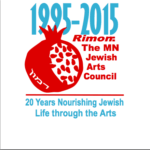“When I first took on this role, I was really approaching it like every other role,” Fellner said. “Often, I play parts that don’t connect with me or my family. This play is especially meaningful because of my family history and my great aunt’s experiences in particular.”
Fellner’s great-aunt was an Auschwitz survivor whose husband was killed after saying he would not work to help the Nazis. Fellner also had many other relatives who escaped either just before the Nazi’s closed up the borders or soon after.
“Many of my relatives who escaped were understandably angry at how their life trajectory was changed. There was a long period where my grandfather, whom I adored, really had a grudge against Germany, which is understandable,” she said. “When it came time to take his children to Europe, he diligently avoided setting foot on German soil.”
Fellner’s great-aunt didn’t hold the same grudge. Fellner said she would always say ‘the Germans are no different than anyone else.’
“We’re very easily manipulated into not viewing people as people,” Fellner said. “She didn’t hold a grudge. I think about that on a daily basis, this beautiful thought that we’re all capable of infinite love.”
Fellner’s great aunt has since passed away, but she has talked to her father about this point of view, and how – despite everything she went through – she was able to have this point of view.
“She was one of those people who just seemed to have a light coming out of them. She got to this place of absolute peace and forgiveness that I want for myself,” Fellner said. “[My dad] asked her how she got there. She looked at him and laughed and said ‘Auschwitz, but I wouldn’t recommend it.'”
In the play, Fellner’s Katharine is a successful gallery owner who is trying to keep her family’s past buried. The threat of exposure intensifies when she introduces Raini (played by Maggie Bearmon Pistner) to her Jewish boyfriend Joel (Michael Torsch), a struggling photographer exploring Judaism in his work. When Katharine inherits her great-aunt’s original film reels that document Adolf Hitler and the rise of the Nazi Party, Joel and Raini’s companion Horst (Dan Hopman) force her to confront the truth: whether Raini’s art is inextricably tied to its subject matter or can be judged for its artistic merit alone.
“When I play a part, I always have to take my character’s side and embrace it. But in this case, I do think that whether or not Leni was actually trying to aid the Nazi party, or if she was just a filmmaker who took a job and did it well, she could easily have still been a loving person, or what we may consider a good person… just as a great many Germans who either did nothing, or even served in the Army could have still been loving fathers, good people,” she said. “We have to remember that to stand up to the Nazis in any way was dangerous. So I do think it is unfair of us to look back at this period of history and blame so many Germans for making the ‘wrong choice.’ Not so long ago in America we had cavalry officers who wiped out millions of people, and then would go back to their tent and write loving letters to their wives and children. Would so many of us do differently if we had these choices and roles put in front of us today? I’m not so sure. Despite this, I have to agree with Anne Frank, that most people are basically good.
“I adore that I got to play this role because if we vilify the Germans, then we don’t learn anything. They’re not different people than we are. And neither were their victims.”
“Aunt Raini” is playing at the Highland Park Community Center until Nov. 20, and tickets can be purchased online. Nov. 10 is the MJTC’s 20s & 30s Night, where anyone 20-39 can get a $15 ticket to the show that night and stay for a post-show mingle with the cast. Like last spring, Beth Jacob’s 20s & 30s group is a participating partner and assists with carpooling.



